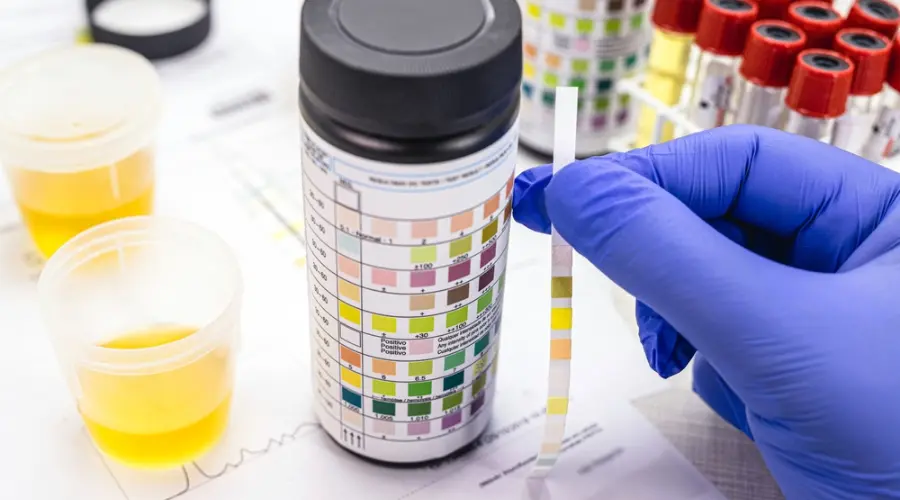Get Answers on Detecting Ketamine and Treatment Options
Waiting for the results of a urine test, blood test, or hair test can be nerve-wracking, especially if you’ve used ketamine in the last month.
So let’s get to the point: does ketamine show up on a 12 panel drug test? How nervous should you be?
Most common drug tests do not detect metabolites from the street drug known as “Special K”. However, a special drug test may be ordered if there is suspicion of ketamine use.
Below, we’ll answer your questions about passing a ketamine drug test and the window for ketamine detection. You’ll also find information on ketamine therapy and treatment alternatives at South Shores Recovery.
Will Ketamine Show Up on 12-Panel Drug Tests?
Ketamine is not included on the typical 12-panel drug test because it is not as frequently abused as cocaine, opiates, marijuana, and other substances.
Drugs that are commonly detectable on a 12-panel drug test include cannabis, cocaine, benzodiazepines, amphetamines, opioids, barbituates, methadone, methaqualone, propoxyphene, and phencyclidine.
Will Ketamine Show Up on a Drug Test for Work?
The most commonly used routine drug test for employment and government agencies is the 5-panel test. 5-Panel drug tests check for the use of amphetamines, cocaine, opiates, cannabis, and PCP.
It does not detect ketamine, most prescription drugs with the exception of narcotics like Dilaudid, or other illegal drugs.
Does Ketamine Show Up on Drug Tests for Probation or Parole?
Testing for ketamine is not standard practice for employers, government agencies, or even officers of the law. Usually, a 5-panel, 10-panel, or 12-panel drug test is administered.
If you have a history of using this drug, however, the court may require a separate test specifically for ketamine. This may be a blood test, urine test, hair testing, or saliva test, though a urine drug test is most common.
Ketamine Metabolites and the Drug Testing Process

As your body processes ketamine or other drugs, certain metabolites are produced. The metabolites change depending on the substance ingested.
Common drug tests won’t detect metabolites left behind by ketamine. However, a ketamine drug test may detect norketamine, hydroxynorketamine, hydroxyketamine, or dehydronorketamine. But when will all signs of the drug disappear?
How Long Does Ketamine Stay in Your System?
If you work somewhere that does random testing for drugs, or if you are on probation and have had a slip-up, you may be wondering how long ketamine stays in your urine, blood, saliva, and hair.
The half-life of ketamine is approximately 2 and a half hours. However, even after it is eliminated, metabolites can be detected. It takes time to become completely undetectable.
The drug metabolizes differently depending on the frequency of treatments, other drug use, overall health, and body mass.
If you are wondering when will traces of ketamine be eliminated, it depends on the drug test. Saliva samples can test positive for up to 24 hours, blood tests for up to 72 hours, and urine samples for up to two weeks after last use. In hair samples, it is even longer, with positive results showing up months after use.
Can My Employer Order a Ketamine Drug Test?
Most employers will not order ketamine drug testing unless there is reasonable suspicion that you are using ketamine for recreational purposes. It is not standard practice because it requires specialized tests and is more expensive.
What is Ketamine Used for?

Ketamine is most commonly used when a patient is under anesthesia, though it also can be used for treatment-resistant forms of depression. It makes you feel detached from pain and your environment.
Effects include feeling calm and relaxed, pain relief, immobilization, and amnesia. It may be prescribed for patients suffering intense, chronic pain.
Can Ketamine Usage Benefit Mental Health?
Ketamine is an FDA-approved medication for surgical settings and pain relief, but only Spravato (eskatamine) is approved by the FDA for depressive disorder treatment. All other forms of ketamine prescribing for mental health are, at this time, considered off-label.
It is up to the provider to determine effective dosages for this type of treatment. In the case of treatment-resistant depression, for example, some people have found success with low doses of ketamine on a more regular basis, while others have found relief from symptoms with large doses taken once a month.
Alternatives to Ketamine Therapy
Ketamine is often prescribed for mental conditions when other therapies have been ineffective at providing relief. SSRIs and other traditional antidepressant drugs are not effective for everyone.
Unfortunately, ketamine comes with a moderate to high risk of abuse and side effects. Alternatives that affect the NMDA receptor, the same receptor that ketamine affects, have been and are currently being developed.
Often, combining medication with therapy to challenge harmful beliefs, address unresolved trauma, and practice emotional regulation is helpful. However, ketamine and other treatments are a personal decision. Only you and your doctor can decide what treatment is the best option.
What Does Ketamine Feel Like?
Recreationally, ketamine usage results in perception changes. It distorts visions and sounds, making you feel detached from reality.
Many people also hallucinate with high enough dosages. When combined with alcohol or other substances, the effects are intensified, and using the drug becomes much more dangerous.
It’s important to seek medical help if you start to experience extreme fatigue, slow breathing, or loss of consciousness from ketamine abuse.
How Do I Know if My Ketamine Use is a Problem?

If you are worried about how the results of standard drug testing will impact your life, it can be a sign that ketamine use is already a problem.
Being unable to stay sober, even if there may be consequences with the law or your employer, shows the likelihood of a substance use problem.
Find Alternatives to Ketamine Treatment at South Shores
Ketamine is not a commonly abused substance, so it is not usually detected in standard drug testing. However, with its strong effects on the body and mind, there is a potential for misuse.
You may be using ketamine or other substances to handle underlying mental health conditions, unresolved trauma, or chronic pain.
In situations like these, treating the underlying condition is critical to avoiding future ketamine abuse. At South Shores Recovery, we understand that.
Our customized treatment plans, evidence-based therapies, and support environment provide the tools necessary for addressing mental health and substance abuse problems. Reach out to learn more about how we can help you today.


Recent Comments